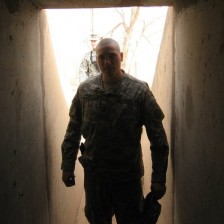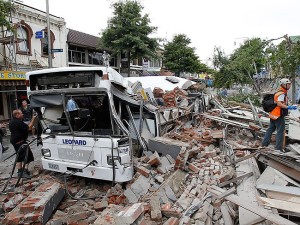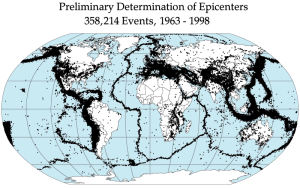I was watching San Andreas the other day, its okay for a disaster film though highly predictable, and it reminded me of all the earth quake drills I used to have as an elementary school kid. You remember those? Get under your desks, cover your head with your hands, and then evacuate the building and take accountability. Which got me thinking; do you still remember what to do if the big one hits?
An earthquake (also known as a quake, tremor or temblor) is the perceptible shaking of the surface of the Earth, which can be violent enough to destroy major buildings and kill thousands of people. The severity of the shaking can range from barely felt to violent enough to toss people around. Earthquakes have destroyed whole cities. They result from the sudden release of energy in the Earth’s crust that creates seismic waves. The seismicity, seismism or seismic activity of an area refers to the frequency, type and size of earthquakes experienced over a period of time.
Earthquakes are measured using observations from seismometers. The moment magnitude is the most common scale on which earthquakes larger than approximately 5 are reported for the entire globe. The more numerous earthquakes smaller than magnitude 5 reported by national seismological observatories are measured mostly on the local magnitude scale, also referred to as the Richter magnitude scale. These two scales are numerically similar over their range of validity. Magnitude 3 or lower earthquakes are mostly almost imperceptible or weak and magnitude 7 and over potentially cause serious damage over larger areas, depending on their depth. The largest earthquakes in historic times have been of magnitude slightly over 9, although there is no limit to the possible magnitude. The most recent large earthquake of magnitude 9.0 or larger was a 9.0 magnitude earthquake in Japan in 2011 (as of March 2014), and it was the largest Japanese earthquake since records began. Intensity of shaking is measured on the modified Mercalli scale. The shallower an earthquake, the more damage to structures it causes, all else being equal.
At the Earth’s surface, earthquakes manifest themselves by shaking and sometimes displacement of the ground. When the epicenter of a large earthquake is located offshore, the seabed may be displaced sufficiently to cause a tsunami. Earthquakes can also trigger landslides, and occasionally volcanic activity.
In its most general sense, the word earthquake is used to describe any seismic event — whether natural or caused by humans — that generates seismic waves. Earthquakes are caused mostly by rupture of geological faults, but also by other events such as volcanic activity, landslides, mine blasts, and nuclear tests. An earthquake’s point of initial rupture is called its focus or hypocenter. The epicenter is the point at ground level directly above the hypocenter.
Be Prepared: Before, During and After an Earthquake
(ca.gov, Department of Conservation)
Do you know how to prepare for and survive a major earthquake? According to Department of Conservation scientists, it will be critical to have the right answer to that question somewhere in California sometime in the coming years.
Many people think having bottled water on hand is a good idea. That’s true, as long as you have enough. Many are certain that standing in a doorway during the shaking is a good idea. That’s false, unless you live in an unreinforced adode structure; otherwise, you’re more likely to be hurt by the door swinging wildly in a doorway or trampled by people trying to hurry outside if you’re in a public place.
How to be Prepared
◦ Electricity, water, gas and telephones may not be working after an earthquake. The police and fire departments are likely to be tied up. You should be prepared to fend for yourself for at least three days, preferably for a week.
◦ You’ll need food and water (a gallon a day per person); a first aid kit; a fire extinguisher suitable for all types of fires; flashlights; a portable radio; extra batteries, blankets, clothes, shoes and money (ATMs may not work); medication; an adjustable or pipe wrench to turn off gas or water, if necessary; baby and pet food; and an alternate cooking source (barbecue or camp stove). This list can also be applied to other disasters, such as floods or wildfires.
◦ It’s also a good idea to decide beforehand how and where your family will reunite if separated during a quake and to conduct in-home practice drills. You might choose an out-of-the-area friend or relative that family members can call to check on you.
◦ Securing water heaters, major appliances and tall, heavy furniture to prevent them from toppling are prudent steps. So, too, are storing hazardous or flammable liquids, heavy objects and breakables on low shelves or in secure cabinets.
◦ Discuss earthquake insurance with your agent. Depending on your financial situation and the value of your home, it may be worthwhile.
During an Earthquake
◦ If you’re indoors, stay there. Get under — and hold onto –a desk or table, or stand against an interior wall. Stay clear of exterior walls, glass, heavy furniture, fireplaces and appliances. The kitchen is a particularly dangerous spot. If you’re in an office building, stay away from windows and outside walls and do not use the elevator.
◦ If you’re outside, get into the open. Stay clear of buildings, power lines or anything else that could fall on you.
◦ If you’re driving, move the car out of traffic and stop. Avoid parking under or on bridges or overpasses. Try to get clear of trees, light posts, signs and power lines. When you resume driving, watch out for road hazards.
◦ If you’re in a mountainous area, beware of the potential for landslides. Likewise, if you’re near the ocean, be aware that tsunamis are associated with large earthquakes. Get to high ground.
◦ If you’re in a crowded public place, avoid panicking and do not rush for the exit. Stay low and cover your head and neck with your hands and arms.
After an Earthquake
◦ Check for fire or fire hazards. If you smell gas, shut off the main gas valve. If there’s evidence of damage to electrical wiring, shut off the power at the control box.
◦ If the phone is working, only use it in case of emergency. Likewise, avoid driving if possible to keep the streets clear for emergency vehicles.
◦ Be aware that items may fall out of cupboards or closets when the door is opened, and also that chimneys can be weakened and fall with a touch. Check for cracks and damage to the roof and foundation of your home.
◦ Listen to the radio for important information and instructions. Remember that aftershocks, sometimes large enough to cause damage in their own right, generally follow large quakes.
◦ If you leave home, leave a message telling friends and family your location.
http://www.conservation.ca.gov/index/Earthquakes/Pages/qh_earthquakes_what.aspx
https://en.wikipedia.org/wiki/Earthquake



Leave a Reply